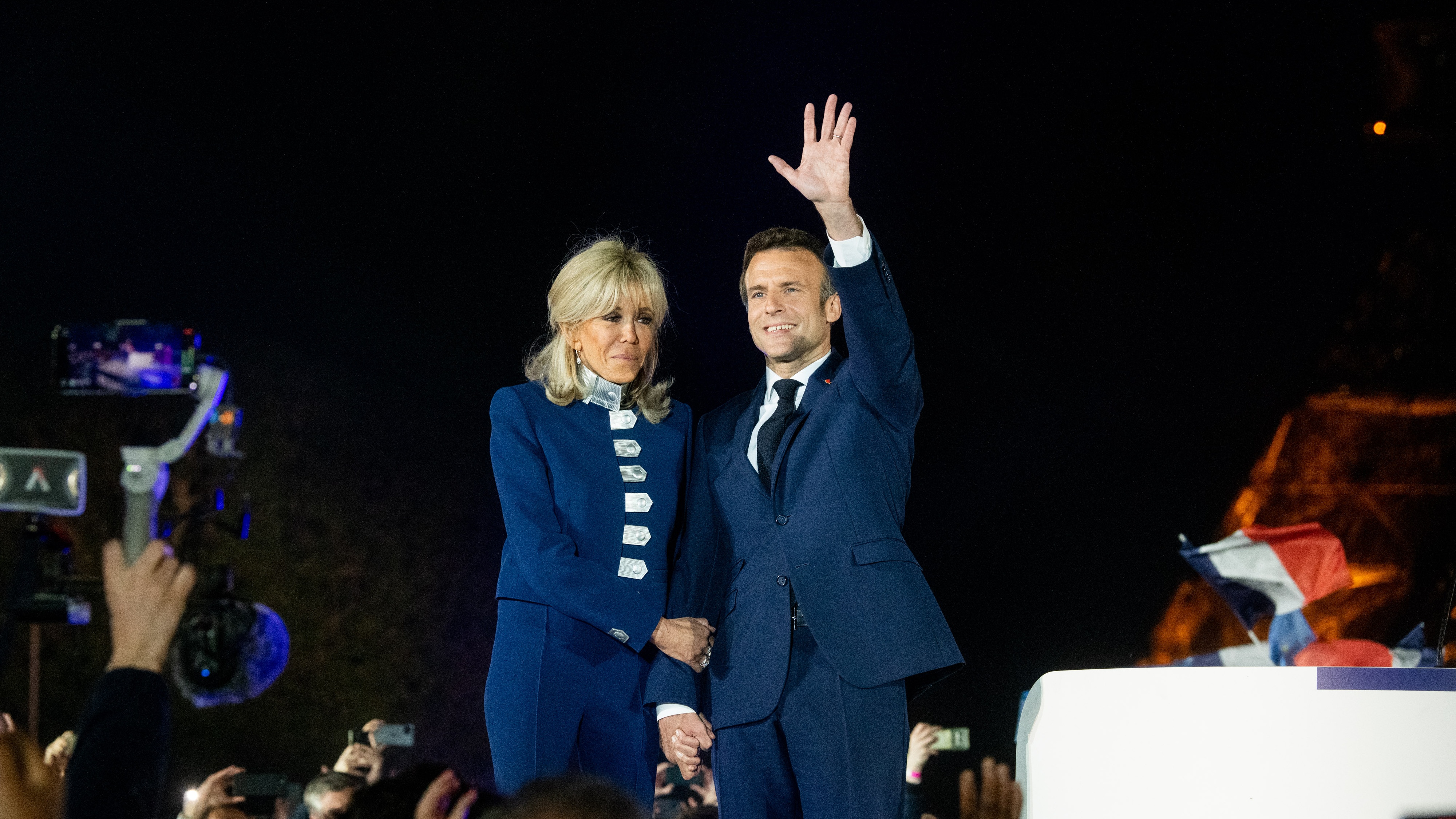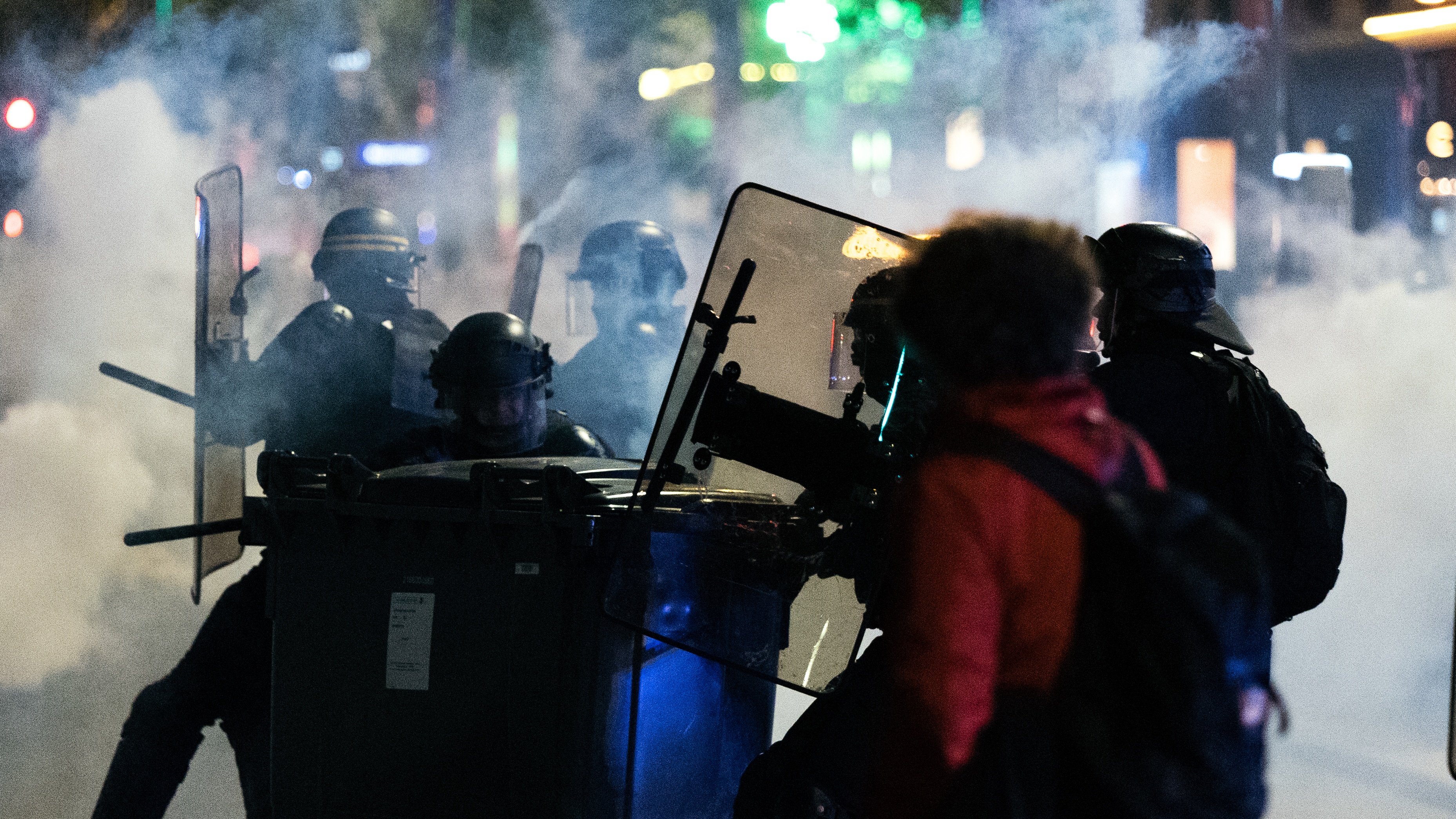Can Emmanuel Macron unite a divided France?
President fends off far-right rival Marine Le Pen to secure historic second term

A free daily email with the biggest news stories of the day – and the best features from TheWeek.com
You are now subscribed
Your newsletter sign-up was successful
Emmanuel Macron has vowed to unite France after becoming the country’s first president in 20 years to win re-election.
Addressing a rally at the foot of the Eiffel Tower following his victory over Marine Le Pen yesterday, Macron vowed to be “the president of all of us” and to respond “efficiently” to the “anger and disagreement” of voters who backed his rival.
“I know that a number of French people have voted for me today, not to support my ideas but to stop the ideas of the far-right,” he said.
The Week
Escape your echo chamber. Get the facts behind the news, plus analysis from multiple perspectives.

Sign up for The Week's Free Newsletters
From our morning news briefing to a weekly Good News Newsletter, get the best of The Week delivered directly to your inbox.
From our morning news briefing to a weekly Good News Newsletter, get the best of The Week delivered directly to your inbox.
Divided Republic
Macron picked up 58.54% of the vote in Sunday’s second-round run-off, comfortably beating Le Pen, on 41.46%. But his National Rally rival “nonetheless won more than 13 million votes in a historic high for her anti-immigration party”, wrote The Guardian’s Paris correspondent Angelique Chrisafis.
“Before the caveats,” said BBC’s correspondent Hugh Schofield, “it is only fair to acknowledge the scale of Macron’s achievement.” The election marks “the first time ever that a governing president of the Fifth Republic has been re-elected”.
And while former presidents “have retained the Elysée before”, Macron is the first in modern times to win a second term since Jacques Chirac was elected back into the top job in 2002. “Which when you consider France’s long-standing relationship with government – which is essentially to cheer ‘em in, then chuck ‘em out at the first opportunity – is no mean feat,” Schofield continued.
The result of yesterday’s vote there are “millions of French people of the middling type who feel that Macron has not been at all a bad president”. But Le Pen’s record vote tally also shows “people in France are now prepared to dally with the ‘extremes’”, added Schofield.
A free daily email with the biggest news stories of the day – and the best features from TheWeek.com
The victorious leader of the centrist Le Marche! (On the March!) party has called for unity, urging his supporters to be kind and respectful” to Le Pen voters amid the clear “division” in French society.
But despite that plea, the vote result triggered violence in cities across France. Police used tear gas to disperse gatherings in Paris, Lyon and Rennes after “several hundred demonstrators from ultra-left groups took to the streets” to protest “Macron’s re-election and Le Pen’s score”, said The Guardian’s Chrisafis.

“There was a large police presence in central Paris hours after the election win, after police opened fire on a car, killing two people inside,” she reported. Whether the incident was linked to the election was unclear.
Healing wounds
Macron may be expected to “toe a more cautious line” following his second victory, said The Telegraph’s correspondent Henry Samuel. The centrist politician is presiding over a country “reeling from successive Yellow Vest revolts, Covid lockdowns and the war in Ukraine”.
As he heads into his second term, he faces further challenges including maintaining the “Franco-Germany engine” that powers the EU; combating “rising living costs”; overseeing his “controversial” pensions reform; and delivering on a pledge to foster “participative democracy” made during the Yellow Vest protests.
Le Pen’s “powerful showing” could “spell trouble” for the under-pressure president, Politico said, and will serve as a “warning shot to Nato and the European Union”.
Even “in one of the EU’s founding countries”, Macron’s best efforts could not stop millions voting for a figure “whose campaign platform advocates dismantling the EU from within by suspending its free-travel rules and downgrading the supremacy of EU law”.
“The most immediate challenge” for Macron, said the site, is leading a “deeply divided country where political anger could easily boil over into street protests and violence”.
All the same, said Sky News’ international affairs editor Dominic Waghorn, Macron’s vote victory will have triggered “sighs of relief across Europe”.
While his “defeat would have led to a seismic shift in world affairs”, Waghorn continued, his historic second term “means the status quo of the last five years goes on”, with France and Germany at “the spine of Europe” and Macron maintaining his “prominent role leading Europe diplomatically”.
However, “the grievances laid bare” by Le Pen’s vote tally “may force him to focus his energies more on domestic issues as he tries to heal the deep divisions exposed during this campaign”.
Warning signs
The result of the election marks “a personal victory for Macron, who has only run for election twice in his life: each time for the presidency, and each time with success”, The Economist said. “But it also carries warnings.”
He “has now kept the forces of populism out of France’s highest office twice”, a feat for which “history will judge him well”. But “the second-term president now has his work cut out if he is to renew the appeal of liberal politics, and reverse the steadily growing success of the extremes”, the paper added.
Macron “will no doubt start this second term promising a new kind of government”, said the BBC’s Schofield. “He’ll be more of a listener. He knows there are wounds that need to heal.”
But another key problem that Macron faces is that “he has said that kind of thing before, and a lot of people simply don’t believe him”.
The president’s European allies are also likely to be “worried by the deep-seated anger and divisions exposed in this election and concerned by the steadily improving fortunes of the far-right in France”, said Sky News’s Waghorn.
So if Macron now has to “spends less time on the world stage now and more time healing his country’s domestic politics”, they will surely “not begrudge his absence”.
-
 Are Hollywood ‘showmances’ losing their shine?
Are Hollywood ‘showmances’ losing their shine?In The Spotlight Teasing real-life romance between movie leads is an old Tinseltown publicity trick but modern audiences may have had enough
-
 A dreamy long weekend on the Amalfi Coast
A dreamy long weekend on the Amalfi CoastThe Week Recommends History, pasta, scenic views – this sun-drenched stretch of Italy’s southern coast has it all
-
 Can foster care overhaul stop ‘exodus’ of carers?
Can foster care overhaul stop ‘exodus’ of carers?Today’s Big Question Government announces plans to modernise ‘broken’ system and recruit more carers, but fostering remains unevenly paid and highly stressful
-
 Greenland’s capital becomes ground zero for the country’s diplomatic straits
Greenland’s capital becomes ground zero for the country’s diplomatic straitsIN THE SPOTLIGHT A flurry of new consular activity in Nuuk shows how important Greenland has become to Europeans’ anxiety about American imperialism
-
 Epstein files topple law CEO, roil UK government
Epstein files topple law CEO, roil UK governmentSpeed Read Peter Mandelson, Britain’s former ambassador to the US, is caught up in the scandal
-
 Iran and US prepare to meet after skirmishes
Iran and US prepare to meet after skirmishesSpeed Read The incident comes amid heightened tensions in the Middle East
-
 Israel retrieves final hostage’s body from Gaza
Israel retrieves final hostage’s body from GazaSpeed Read The 24-year-old police officer was killed during the initial Hamas attack
-
 China’s Xi targets top general in growing purge
China’s Xi targets top general in growing purgeSpeed Read Zhang Youxia is being investigated over ‘grave violations’ of the law
-
 Panama and Canada are negotiating over a crucial copper mine
Panama and Canada are negotiating over a crucial copper mineIn the Spotlight Panama is set to make a final decision on the mine this summer
-
 Why Greenland’s natural resources are nearly impossible to mine
Why Greenland’s natural resources are nearly impossible to mineThe Explainer The country’s natural landscape makes the task extremely difficult
-
 Iran cuts internet as protests escalate
Iran cuts internet as protests escalateSpeed Reada Government buildings across the country have been set on fire